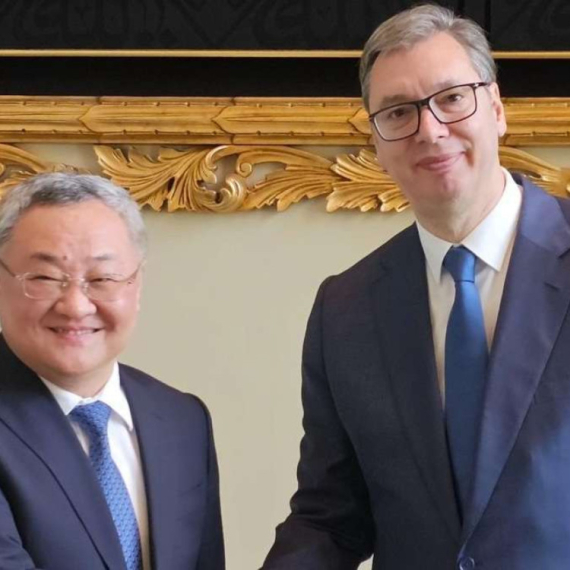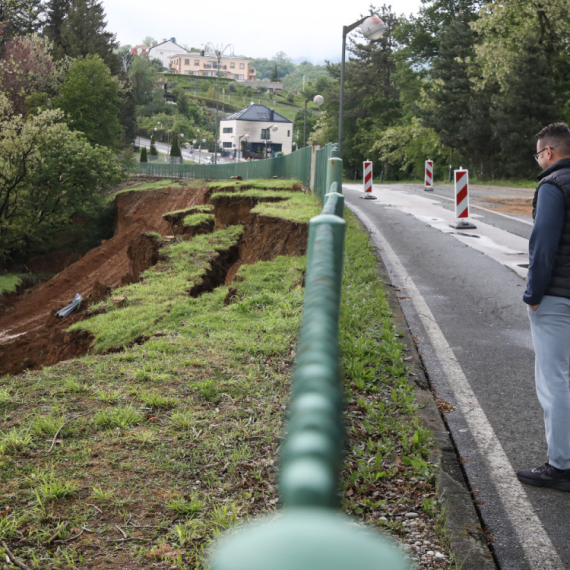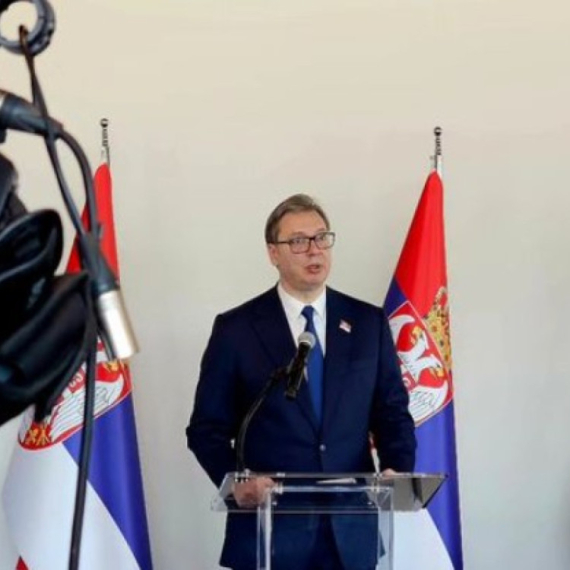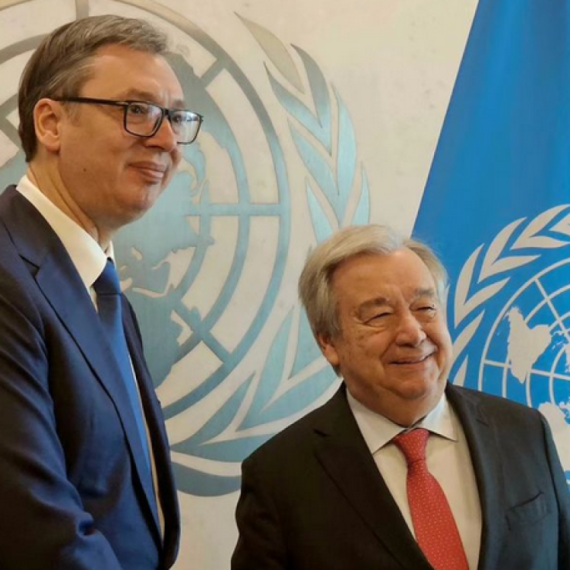President: Without EU Serbia can sink into nationalism
Serbian President Boris Tadić has warned that a delay and new conditions in the EU integration process increase the danger of new instability.
Thursday, 08.12.2011.
09:37

Serbian President Boris Tadic has warned that a delay and new conditions in the EU integration process increase the danger of new instability. He added that it also represented a threat that Serbia, and the Western Balkans alongside it, could once again sink into the darkness of nationalism and intolerance. President: Without EU Serbia can sink into nationalism In a piece for Frankfurt-based daily Frankfurter Allgemeine Zeitung, Tadic pointed out that EU membership was Serbia's strategic goal, just as Serbia's European orientation should be of strategic importance to the EU. The Serbian president reminded that the country had fulfilled all earlier conditions in the EU accession process, which involved making some unpopular and difficult decisions, taking on great political responsibility and, in some cases, even a great personal risk. “The question arises why Serbia is being pushed to the sidelines of contemporary historical processes and why the enormous political efforts, undertaken in order to make a clean break with the policies which led to the wars in the former Yugoslavia, are in advance condemned to failure and defeat? Will this not be too big a trial for the Serbian society and the fledgling Serbian democracy," he wondered in the text entitled “Serbia at a European Crossroads”. “If Serbia is kept outside the EU, this will long be seen as evidence that the special system of values used to define Europe as a community is just an illusion of the eternal politics of the big and the small,” Tadic warned. “Today more than ever, it is obvious that Serbia's European integration process depends not only on the readiness and ability to complete the social and economic reforms under way in the country, but also on to what extent the EU is ready to complete, in the foreseeable future, its mission of establishing a zone of peace, prosperity and stability on the whole European continent,” the president explained. “Regardless of when Serbia and Europe will be ready for one another, Serbia will keep up the pace of social, political and economic reforms,” he pointed out. Tadic recalled that the European Commission also positively assessed Serbia's reform efforts and results. “Based on what has been accomplished, Serbia deserves to obtain the EU candidate status as it is, and assuming the launched issues are resolved in the dialogue with Pristina, accession talks could be opened soon,” Tadic underlined. The Serbian president admitted that Kosovo was currently Serbia's biggest challenge, adding that Serbia would not recognize the unilaterally declared independence of its southern province. “However, Serbia does wish to find a solution for the issue of Kosovo, regardless of whether it will one day become an EU member or not, because the country does not want another unresolved conflict in the Balkans. In searching for a functional solution to this issue, Serbia relies, among other things, on the experience of East and West Germany, which - not without controversies and interference - had had long and arduous talks on the regulation of their relations,” Tadic stressed. “This is precisely why the position held by certain influential German politicians that Serbia should above all and immediately resolve the issue of Kosovo so as to become an EU candidate is surprising and opposes the opinion of the majority of their colleagues,” he added. “We believe our EU membership is not grounded solely on geographical position, historical processes or economic interests. We truly believe in a joint, European political culture and joint responsibility for peace and stable development of our entire continent. Those who deny us that seem to be questioning our painful memory that some of the most dreadful events in European history occurred precisely on our territory, all throughout the 20th century,” the president pointed out. “The idea of greater Europe goes beyond the current 27 member states. Europe will not be complete without the Western Balkans, and that is not possible without a European, democratic and prosperous Serbia at its center,” Tadic concluded. Boris Tadic (Tanjug, file)
President: Without EU Serbia can sink into nationalism
In a piece for Frankfurt-based daily Frankfurter Allgemeine Zeitung, Tadić pointed out that EU membership was Serbia's strategic goal, just as Serbia's European orientation should be of strategic importance to the EU.The Serbian president reminded that the country had fulfilled all earlier conditions in the EU accession process, which involved making some unpopular and difficult decisions, taking on great political responsibility and, in some cases, even a great personal risk.
“The question arises why Serbia is being pushed to the sidelines of contemporary historical processes and why the enormous political efforts, undertaken in order to make a clean break with the policies which led to the wars in the former Yugoslavia, are in advance condemned to failure and defeat? Will this not be too big a trial for the Serbian society and the fledgling Serbian democracy," he wondered in the text entitled “Serbia at a European Crossroads”.
“If Serbia is kept outside the EU, this will long be seen as evidence that the special system of values used to define Europe as a community is just an illusion of the eternal politics of the big and the small,” Tadić warned.
“Today more than ever, it is obvious that Serbia's European integration process depends not only on the readiness and ability to complete the social and economic reforms under way in the country, but also on to what extent the EU is ready to complete, in the foreseeable future, its mission of establishing a zone of peace, prosperity and stability on the whole European continent,” the president explained.
“Regardless of when Serbia and Europe will be ready for one another, Serbia will keep up the pace of social, political and economic reforms,” he pointed out.
Tadić recalled that the European Commission also positively assessed Serbia's reform efforts and results.
“Based on what has been accomplished, Serbia deserves to obtain the EU candidate status as it is, and assuming the launched issues are resolved in the dialogue with Priština, accession talks could be opened soon,” Tadić underlined.
The Serbian president admitted that Kosovo was currently Serbia's biggest challenge, adding that Serbia would not recognize the unilaterally declared independence of its southern province.
“However, Serbia does wish to find a solution for the issue of Kosovo, regardless of whether it will one day become an EU member or not, because the country does not want another unresolved conflict in the Balkans. In searching for a functional solution to this issue, Serbia relies, among other things, on the experience of East and West Germany, which - not without controversies and interference - had had long and arduous talks on the regulation of their relations,” Tadić stressed.
“This is precisely why the position held by certain influential German politicians that Serbia should above all and immediately resolve the issue of Kosovo so as to become an EU candidate is surprising and opposes the opinion of the majority of their colleagues,” he added.
“We believe our EU membership is not grounded solely on geographical position, historical processes or economic interests. We truly believe in a joint, European political culture and joint responsibility for peace and stable development of our entire continent. Those who deny us that seem to be questioning our painful memory that some of the most dreadful events in European history occurred precisely on our territory, all throughout the 20th century,” the president pointed out.
“The idea of greater Europe goes beyond the current 27 member states. Europe will not be complete without the Western Balkans, and that is not possible without a European, democratic and prosperous Serbia at its center,” Tadić concluded.


























































Komentari 54
Pogledaj komentare